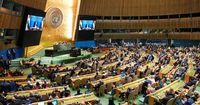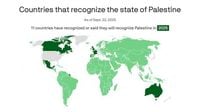In a dramatic diplomatic pivot, several major Western nations have formally recognized the State of Palestine, signaling a significant shift in international attitudes toward the Israeli-Palestinian conflict. The announcements came during the 80th session of the United Nations General Assembly in New York, where France, Luxembourg, Malta, Monaco, Andorra, and Belgium joined a growing list of countries—including the United Kingdom, Canada, Australia, and Portugal—in granting official recognition to Palestinian statehood. This wave of recognitions, occurring nearly two years into the devastating Israel-Hamas war, is poised to reshape the geopolitical landscape and intensify debates at the UN and beyond.
UK Prime Minister Keir Starmer, in a video statement released Sunday, framed the move as a moral imperative amid what he called the "growing horror in the Middle East." He stated, "In the face of the growing horror in the Middle East, we are acting to keep alive the possibility of peace and of a two-state solution." Starmer was unequivocal in his condemnation of Hamas, describing the group as a "brutal terror organization" that must have no role in Gaza's governance. "A call for a genuine two-state solution is the exact opposite of their hateful vision," he said, emphasizing that the recognition of Palestine is intended to empower moderates and advocates for peaceful coexistence.
Canadian Prime Minister Mark Carney echoed this sentiment, declaring in a Sunday statement, "Recognising the State of Palestine, led by the Palestinian Authority, empowers those who seek peaceful coexistence and the end of Hamas." He added that doing so "in no way" legitimizes or rewards terrorism, a direct rebuttal to critics who argue that such recognition emboldens extremist factions.
France's President Emmanuel Macron, whose government formally recognized Palestinian statehood on Monday, described the move as necessary for establishing a sustainable peace. Macron, coordinating with the UK and under Saudi sponsorship, said, "Right must prevail over might." His strategy, as reported by BBC, is to keep the two-state solution viable, offering a diplomatic alternative to the ongoing military catastrophe in Gaza and the relentless expansion of Israeli settlements in the West Bank. Macron's efforts were bolstered by support from Saudi Arabia and the Arab League, who urged Hamas to disarm and hand over its weapons to the Palestinian Authority, signaling a unified front among key Arab nations for a peaceful resolution.
These recognitions mark a historic moment in the century-old conflict. As of September 2025, the State of Palestine is recognized by 157 of the 193 UN member states, representing 81 percent of the international community, in addition to the Holy See. This wave of support includes 11 new recognitions in 2025 alone, with Mexico joining the fold, and brings the total to 20 countries since the outbreak of the Israel-Hamas war in October 2023.
The practical implications of recognition are significant. According to Al Jazeera, it allows Palestine to open embassies with full diplomatic status, engage in trade agreements, gain support at international forums, and approach the International Criminal Court. However, recognition does not end the war in Gaza or halt Israel's occupation of Palestinian territories. As Martin Griffiths, director of Mediation Group International, told Al Jazeera, "This is the entry point, but it's not the end point." He urged recognized nations to uphold their obligations by facilitating humanitarian aid, ending arms sales, and easing blockades, while also supporting reforms to make the Palestinian Authority "fit for purpose."
The reaction from Israel has been swift and furious. Israeli Prime Minister Benjamin Netanyahu, responding to the UK's recognition, declared, "You are rewarding terror with an enormous prize." He insisted that a Palestinian state "will not happen," framing the recognitions as a response to the October 7, 2023, Hamas attacks and hostage taking. Israel's UN ambassador, Danny Danon, dismissed the UN summit as a "circus" and claimed that moves to recognize Palestine "reward terrorism." Some members of Netanyahu's coalition have even called for the annexation of parts of the occupied West Bank, which would effectively end any hope for a viable Palestinian state on that territory.
The United States, under President Donald Trump, stands apart from its European allies, opposing the recognitions and maintaining steadfast support for Israel. The Trump administration barred Palestinian Authority President Mahmoud Abbas from attending the UN conference, forcing him to participate via video link. The US also vetoed a widely supported resolution in April 2024 that would have granted Palestine full UN membership, a move consistent with its long history of blocking Security Council measures critical of Israel. As BBC noted, this marks the deepest ever split between Washington and its European allies over the conflict, underscoring America's enduring influence as the "superpower of today."
The roots of the recognition debate stretch back decades. In November 1988, during the first Intifada, Yasser Arafat declared the establishment of an independent State of Palestine with Jerusalem as its capital. More than 80 countries, primarily from the Global South, quickly extended recognition. The 1993 Oslo Accords, which envisioned a Palestinian state alongside Israel, failed to materialize into lasting peace. In 2012, the UN General Assembly upgraded Palestine's status to "non-member observer state," granting it the ability to participate in debates but not to vote on resolutions.
The current wave of recognitions is seen by many as a diplomatic gamble. European leaders, referencing their colonial legacies in the Middle East, argued that just as the international community recognized Israel after Britain's withdrawal in 1948, it is now time to recognize the Palestinians' equal right to statehood. Yet, as BBC's analysis points out, these are "the superpowers of the past," and without US backing, Palestinian statehood remains largely symbolic. President Trump, scheduled to address the UN on September 23, 2025, is expected to reiterate his administration's opposition to the European-led initiative.
Meanwhile, the situation on the ground remains dire. Israel is deploying a third army division into Gaza City, with dozens of Palestinians killed daily. Hamas continues to hold nearly 50 hostages, many presumed dead. The West Bank faces ongoing settlement expansion and settler violence, further dimming prospects for peace. UN Secretary-General António Guterres warned that the alternative to a two-state solution is a "one-state" reality of Israeli domination and the "subjugation" of Palestinians, and he insisted that "nothing could justify their collective punishment, starvation or any form of ethnic cleansing."
As the world watches the diplomatic drama unfold at the United Nations, the question remains whether this surge of recognition can translate into meaningful change on the ground. For now, the recognitions send a powerful message of hope and solidarity with the Palestinian people, but the path to peace—and to a truly independent Palestinian state—remains fraught with obstacles.



